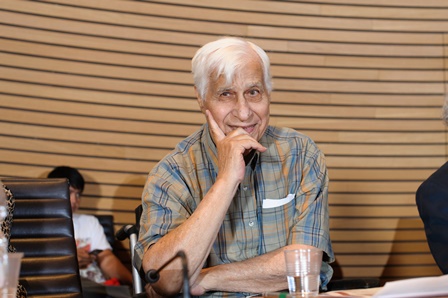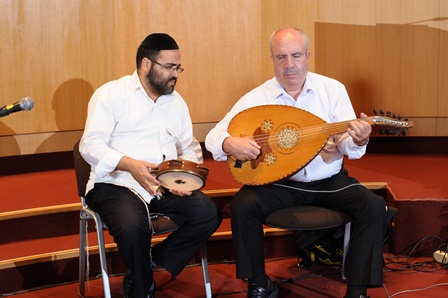Pictured above: Prof. Aomar Boum with Prof. Steve Rosen, Vice President for External Affairs
BGU awarded the
inaugural Shaul Ben-Simhon Prize for the Study of North African Jewry to UCLA’s
Prof. Aomar Boum last week. Prof. Boum, a Moroccan
Muslim-American researcher has written extensively about Moroccan Jewry and Muslim-Jewish
relations in Morocco. Boum was born and raised in a village in the Sahara that
had once been home to a Jewish community. This experience made a deep
impression on him, leading him to his future academic endeavors. He has written
a number of books on the topic, and beyond his research he is active in
Muslim-Jewish relations and considers the memory and heritage of Jewish Morocco
to be of particular significance.
The prize was awarded by the new Ben-Simhon
North African Jewry Fund, which was founded by BGU and the World Organization
of North African Jews. Dr. Orit Oknin-Yekutieli of the Department of Middle
East Studies heads the new foundation.
“I want to thank my wise illiterate
parents: They never attended school but as a child growing up in southern
Morocco at the margin of the desert they taught me that life is about patience,
perseverance and humility and without these qualities and respect of others, strong
communities built on mutual respect and civic understanding would not exist,”
he said at the ceremony.
Prof. Boum has a PhD from the University of Arizona.
He
is a socio-cultural anthropologist with a historical bent concerned with the
social and cultural representation of and political discourse about religious
and ethnic minorities in the Middle East and North Africa. His ethnographic work engages many cultural,
social, political and academic taboos in the Middle East and North Africa
region including the place of religious minorities such as Jews, Baha’is, Shias
and Christians in post-independence nation states.
His multi-disciplinary
background and academic experience are at the intersections of Middle Eastern
and North African studies, Islamic studies, Religious studies, African studies
and Jewish studies. He has written on different topics such as Moroccan Jewish
historiography, Islamic archives and manuscripts, education, music, youth, and
sports among other things.
Much of his
work has focused on the anthropology of Jewish-Muslim relations in an age of
communal violence especially generational Muslims’ memories of Moroccan Jews
through ethnographic studying down and up strategies.
He is
currently working on two ethnographic and historically grounded projects: The Monarchy,
Jews and Holocaust politics in Morocco, 1930s-Present and Virtual Jews: an
Ethnography of Moroccan Jews Online.
“When I began my ethnographic work in 2002
in the hamlets, villages, ksours and oases of Tata, Morocco, one of recurrent themes
of the many conversations I had with the elderly is a nostalgia for Jewish
life. Ever since, I have been intrigued by the question of memory, remembering
and forgetting through oral narratives and history… Why focus on Muslims’
memories of Jews? In less than seventy years, the Jewish population of Morocco
went from 240.000 in the late 1940s to less than 3000 in 2017. And yet, more
than 1 of 8 Jews living in Israel today are of Moroccan origin. Moroccan Jewish
migration to Israel, France, and Canada was one of the largest waves of
migration that took place in North Africa prior and during the first decades of
independence in the Arab world, creating a major economic, cultural, and social
void with the departure of a community that has been an essential player in the
history of the Maghreb,” he said.
“The study of Muslim-Jewish relations…
remains all the more urgent today, for one cannot ignore the many political
positions that inform, whether explicitly or implicitly, the public understanding
of this relationship: the continued political support of political parties and the
wide majority of Moroccan society to the Palestinian cause, the Monarchy’s
official and unofficial historical relations with Israeli leadership, the
unofficial Moroccan-Israel economic relations, the movement opposed to normalizing
relations with Israel sponsored by civil organizations, the growing rift between
Berber and Arab activists over relations with Moroccan Jews in Israel, and the
position of Israel itself,” he argued.
Boum noted his own unique role as a Muslim
Moroccan researcher of Moroccan Jewry.
“While a number of Israeli and American anthropologists
have been attracted to the study of Moroccan Jews (Clifford Geertz, Lawrence
Rosen, Kenneth Brown, Moshe Shokeid, Harvey Goldberg and Dale Eickelman, Andre
Lévy, Yoram Bilu), only a handful of Moroccan native historians, like Jamaâ
Baida and Mohammed Kenbib, dared to look at historical questions related to Moroccan
Jewries, but with little consideration of the post-colonial period.
“Studying Jews in Moroccan academia has always
been a risky taboo. The cultural stigma on both sides has created what I call
the ideological entrenching of nationalist histories and historiographies.
After the establishment of the State of Israel, the Zionist narrative dominated
the histories and historiographies of Middle Eastern and North African Jewries
which assumed the inevitability of departure and aliyah, reading back into a
history two separate and antagonistic groups.
“Accordingly, Jews and Arabs were largely
kept as distinct binaries divided by the intellectual walls that separated
Middle East studies and Jewish studies as fields of study. Almost all Moroccan
scholars silenced or overlooked the Jewish dimension of Middle Eastern societies in the same manner
that almost all Israeli scholars until recently tended to ignore the historical
connections between Arabs and Jews that existed both before and after 1948.
“Being a Muslim and doing an ethnography about
Moroccan Jews from Muslims’ perspectives has complicated the ethnographic process
since the early stages of my research and continues to do so,” he said, “In the minds of many informants, you need to
be Jewish to be interested in Jews, although I learnt later that many Jews
share this assumption too given the fact that every time I give a talk I get
asked are you Jewish: the lingering assumption in both groups is that you have
to be Jewish to be interested in Jews, Judaism and Holocaust history. My
project aims at challenging this intellectual tribalism by conducting deep
ethnographies about the complex interplays of Jewish-Muslim relations in
colonial and post-colonial times.”

Pictured above: Shaul Ben-Simhon
